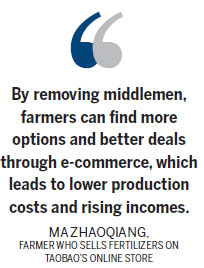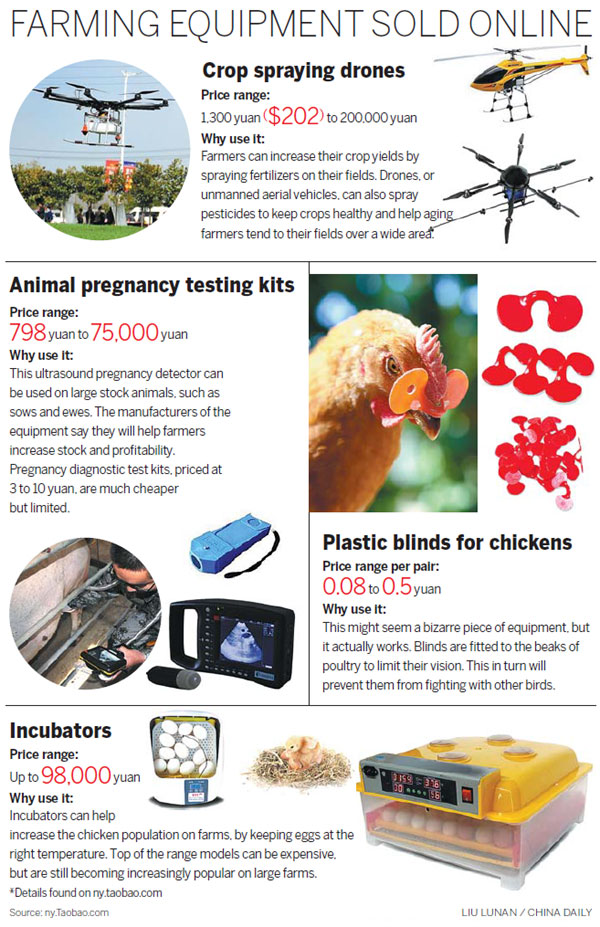Seeds of success planted online

A new breed of tech-savvy farmers and merchants are using the Internet to boost their incomes
Sweat is dripping off Qiao Xuebao as he walks through a maze of greenhouses that contain seedlings for household plants in five million pots.
His operation in the rural area of Suqian city in the eastern province of Jiangsu stretches across 50,000 square meters, roughly the size of seven soccer pitches.
In the summer, the work is hard due to the hot and humid conditions, but this is the best time of the year for Qiao's business, Sutai Yuanyi Co.
Even though he has invested 50 million yuan ($8 million) in expanding his greenhouse network, he still worries that he does not have enough plant pots.
"Do not ever underestimate the demand for pot plants," the 38-year-old says while declining to reveal detailed financial figures. "Through e-commerce, you can sell them to every corner of China and direct to consumers as well as stores such as florists."
Just like the way the Internet has become part of everyday life, e-commerce is changing the landscape of the agriculture sector in China by helping the country's new breed of small and medium-size farms greater access to sell their products.
Qiao, who employs a 20-strong work force, is just one of 100,000 farmers and merchants on Taobao, the shopping platform owned by e-commerce giant Alibaba Group Holding Ltd. These businesses are starting to cash in by selling products online, ranging from pesticides to fertilizers, seedlings to plants and even farm tools to tractors.
The industry has such great potential that Taobao even launched a dedicated shopping channel last month just for the sector. JD.com, Alibaba's biggest e-commerce rival in China, quickly followed suit within a few weeks.
A glance at the figures illustrates the scale of the market for farming goods and equipment, which hit 2.3 trillion yuan in China last year. While there are no online numbers as yet, Taobao has reported that overall sales have grown at an annual rate of 180 percent during the past three years, even before it rolled out a dedicated channel.
"By removing middlemen, farmers can find more options and better deals through e-commerce, which leads to lower production costs and rising incomes," says Ma Zhaoqiang, whose company, Feixiang Nongzi, has been selling fertilizers on Taobao's online store since 2012.
Ma lives in Linyi city in East China's Shandong province and his fertilizers are 50-percent cheaper than local stores because he sells direct to farmers.
"At first, a lot of farmers questioned the quality of my products because I was selling them so cheap," the 28-year-old says. "But it is not too difficult to understand the reason for the price difference. I get my products direct from the producers or their dealers at national level.
"In the traditional way, prices of products soar as they change hands," he adds. "The dealers at provincial, city, county and township levels all need to raise the price to make money."
Ma has seen his online Taobao store thrive in the past three years. His daily orders have surged from one or two when he first started to 300, with sales worth more than 100,000 yuan.
Yet his success is in stark contrast to what is happening at his father's traditional fertilizer store in Linyi. There, sales are down to 3,000 yuan or even 2,000 yuan a day because he only sells his products to neighborhood farmers.
"No one in other parts of the country know about my father's store," Ma says. "And no one will fly over here to physically pick up their orders.
"But with e-commerce, I can send my products to anyone in the country via a courier service. All they need to do is place orders on a smartphone or a computer."
Ma's online operation is just what the government is looking for.
At a regular meeting of the State Council in March, Premier Li Keqiang made it clear that it was crucial to modernize the agriculture industry, with technology playing a major role.
"The central government has allocated 3.7 billion yuan so far this year to support e-commerce development in central and western parts of China," Shen Danyang, spokesman for the Ministry of Commerce, says last month. "Financial support will cover about 200 counties in 26 provinces. This will help farmers, create more jobs and increase incomes."

Half of China's 1.34 billion population live in villages, and at the end of 2010, 125 million were connected to the Internet, a report by the China Internet Network Information Center revealed. The figure had climbed to 186 million by the end of June.
But more work still needs to be done to help farmers and merchants connect to the Web and boost their sales.
Tang Lin, who comes from Biancang town in Jiangsu, has set up a "service station", or small store, to help farmers order agricultural-related products online, such as pesticides and fertilizers.
"A lot of the farmers are not tech-savvy enough to shop online," he says. "So they often come to me for help. Gradually, I became a purchasing agent and now I make small money out of the business," he adds, pointing out that most of the younger generation like him no longer farm themselves.
The major e-commerce companies are also playing a vital role in helping farmers improve their Internet skills.
Alibaba built 1,803 Taobao Rural Service Stations in 17 provinces last year - part of a 10 billion yuan investment plan over the next five years. And JD.com has been encouraging employees who are from rural areas to go back to their hometowns to set up delivery businesses.
"We hope each village in China can have a born-and-bred farmer who can work as a catalyst to educate the entire village about e-commerce," Zhang Yong, chief executive officer of Alibaba, says in Zhejiang province last month.
Apart from tech-related issues, farmers also need specialist advice on what fertilizers to buy and knowledge about crop diseases. Ma, from Linyi, taps into his father's vast agricultural experience to come up with answers to problems.
"Farmers usually send me photos of their products and let me give a diagnosis for their plants," he says.
Ni Liang, a senior director at Taobao, expects e-commerce to boost incomes for farmers and improve the entire logistics chain. "From buying seeds and farming equipment online to improving agricultural knowledge, e-commerce will play a major role," he says. "Ultimately, this will help sell more high-quality products online and boost incomes in the farming sector."
Big data will also be crucial. This is a broad term for processing vast amounts of complex statistics, which can be boiled down into market and consumer trends.
In the agricultural industry, oversupply can force farmers to sell their crops at knockdown prices. Hopefully, that will change in the future.
"With more farmers buying and selling online, we can eventually gather enough data to predict the supply and demand situation through big data technology," Ni says. "That is the ultimate goal."
But analysts believe there is still a long way to go before the online farming industry can be sustainable as well as financially successful.
Wang Xiaoxing, an analyst with Beijing-based Internet consultancy Analysys International, says quality control needs to be tightened up.
"Unlike consumers products, where if you find fake goods you can return them, farmers who buy fake fertilizer or fake seeds can rarely spot the problem until it is too late," he says.
Ma Si contributed to this story.
mengjing@chinadaily.com.cn

(China Daily European Weekly 08/14/2015 page21)
Today's Top News
- Japan tempting fate if it interferes in the situation of Taiwan Strait
- Stable trade ties benefit China, US
- Experts advocate increasing scope of BRI to include soft power sectors
- New engine powers cargo drone expansion
- China to boost green industry cooperation
- Manufacturing PMI rises in November






























